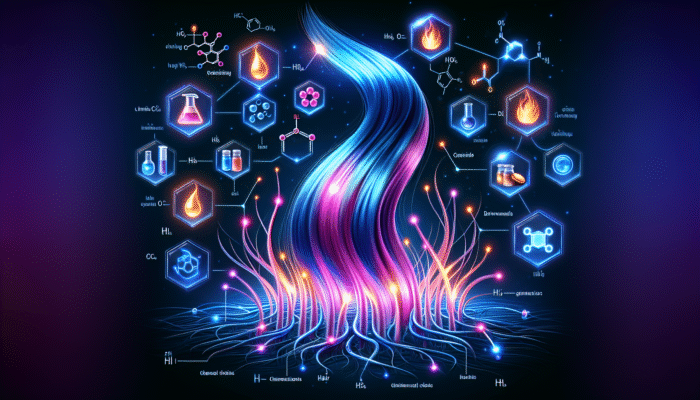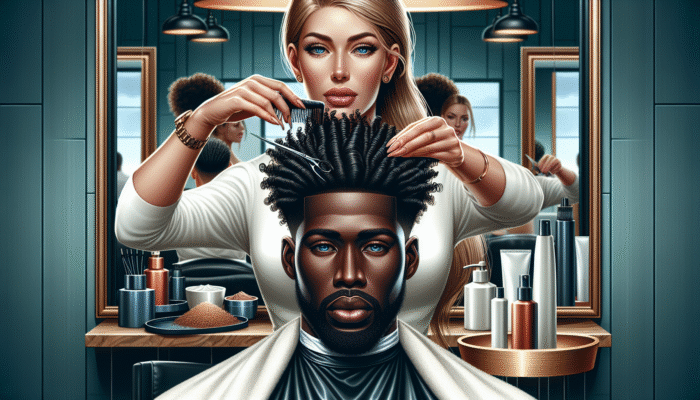Discover Effective Bond-Building Treatments to Transform Your Hair Care Routine
Comprehending the Functionality of Bond-Building Treatments for Hair Restoration

So, what precisely is a bond-building hair treatment? These pioneering treatments signify remarkable progress in the domain of hair care, meticulously crafted to repair and reinforce the internal architecture of hair. Their foremost aim is to restore broken disulfide bonds, which are vital for upholding the integrity and resilience of hair strands. A multitude of stressors, such as chemical processes like dyeing and perming, excessive heat from styling equipment, or damage inflicted by environmental factors, can render hair fragile and susceptible to breakage. The core objective of bond-building treatments is to reconnect these essential bonds, yielding hair that is not only healthier but also visibly more vibrant and full of vitality.
The importance of bond-building treatments transcends mere visual enhancements; they play a crucial role in fostering overall hair health, establishing them as an indispensable part of contemporary hair care routines. As individuals increasingly seek effective methods to rejuvenate their hair’s natural allure, grasping the core principles underlying these treatments becomes essential for making well-informed decisions.
Understanding the Mechanism of Bond-Building Treatments: A Scientific Perspective
The potency of bond-building treatments is anchored in their scientifically crafted formulations, specifically designed to re-establish the broken disulfide bonds within each hair strand. These bonds underpin the structure of hair, providing strength, shape, and elasticity. A multitude of factors, including chemical exposure, heat, and environmental aggressors, can jeopardise these bonds, leading to issues such as split ends, frizz, and an overall lacklustre appearance.
Upon application of a bond-building treatment, a powerful combination of active ingredients is introduced, effectively penetrating the hair shaft and targeting damaged areas. Through a complex chemical process, these treatments successfully restore the hair's structure by creating new bonds where damage previously existed. This not only fortifies the hair but also enhances its elasticity, significantly reducing the likelihood of future damage.
The results can be life-changing: hair that appears healthier, shinier, and significantly easier to manage. By consistently incorporating these treatments into your hair care regimen, you can markedly improve not only the visual appeal of your hair but also its resilience against daily wear and tear, leading to lasting beauty.
Unearthing the Comprehensive Benefits of Bond-Building Treatments
The advantages of bond-building treatments extend far beyond superficial enhancements. One of the most significant benefits is the considerable reduction in hair breakage. By reinforcing the internal structure of the hair, these treatments form a protective barrier against various damaging elements, including heat styling and environmental stressors. Many users report a notable decline in split ends and overall hair breakage with consistent use of these treatments.
Additionally, another crucial advantage of these treatments is the enhancement of shine and smoothness. As the hair’s strength is reinstated, its ability to reflect light improves, resulting in a lustrous, radiant appearance. This enhancement is particularly beneficial for individuals with curly or textured hair, as bond-building treatments can also enhance manageability, decrease frizz, and facilitate the styling process.
Moreover, the increased hydration and moisture retention provided by these treatments are essential for preserving optimal hair health. Well-hydrated hair is less prone to brittleness and responds more favourably to various styling techniques. Overall, the extensive benefits derived from bond-building treatments establish them as a critical component of any effective hair care regimen.
Recognising Who Can Benefit from Bond-Building Treatments

A diverse range of individuals can benefit from bond-building treatments, regardless of their hair type. These treatments are particularly advantageous for those whose hair has suffered damage from chemical processes, such as colouring or permanent waves. The harsh chemicals involved in these procedures can significantly weaken hair, making it more vulnerable to breakage and loss of vitality.
Furthermore, anyone who frequently employs heat styling tools—like straighteners or curling wands—will find bond-building treatments to be especially beneficial. Continuous exposure to high temperatures can gradually compromise the hair structure, leading to long-term damage that can be mitigated with regular treatments.
Moreover, environmental factors such as pollution and UV exposure can exacerbate hair deterioration. For those residing in urban settings or regions with harsh climates, incorporating these treatments into their hair care routine can effectively counteract the cumulative effects of environmental stressors. Ultimately, anyone looking to rejuvenate their hair's natural strength and vitality will find bond-building treatments to be a valuable and restorative solution.
Properly Incorporating Bond-Building Treatments into Your Hair Care Regimen: A Practical Guide
Integrating bond-building treatments into your existing hair care regimen can be more straightforward than it may seem. For optimal results, consider using these treatments as a weekly hair mask, allowing the potent ingredients sufficient time to penetrate and repair damaged areas effectively. By applying a bond-building mask weekly, you can significantly enhance your hair's health over time.
Alternatively, you may prefer to integrate these treatments into your regular shampoo and conditioner routine. Numerous brands provide products specifically designed to work in synergy with bond-building benefits. By selecting these specially formulated shampoos and conditioners, you ensure that your hair receives ongoing support throughout its repair journey.
Consistency is paramount; the more regularly you engage with these treatments, the more pronounced the results will be. Over time, you can expect to see improvements in your hair’s texture, strength, and overall appearance. Always adhere to the instructions provided with each product, as specific guidelines will help you maximise the benefits tailored to your unique hair type and condition.
Exploring the Diverse Types of Bond-Building Treatments Available
In-Salon Bond-Building Treatments: Premium Solutions for Hair Repair

In-salon bond-building treatments epitomise the pinnacle of hair restoration, presenting intensive solutions for individuals grappling with severely damaged locks. These professional treatments typically utilise advanced formulations that may not be accessible in retail products, often incorporating proprietary complexes to achieve superior results.
A visit to a salon for a bond-building treatment can be a transformative experience. Expert professionals evaluate your hair's unique condition and tailor the treatment to effectively address specific concerns. This customised approach ensures that the treatment targets the most pressing issues, ranging from split ends to extreme dryness or brittleness.
Many salons employ high-quality brands renowned for their efficacy in bond repair. The application process usually involves a comprehensive cleansing, followed by a treatment phase, and concludes with a conditioning stage that seals in the advantages of the treatments. Immediate results are often discernible, with clients leaving the salon with hair that feels revitalised and appears radiant.
For anyone with significantly damaged hair, in-salon treatments can provide the essential boost to restore health and vitality, establishing a foundation for continued care at home.
Convenient At-Home Bond-Building Products: Simplified Hair Care Solutions
The rise of at-home bond-building products offers a convenient means for individuals wishing to uphold healthy hair between salon appointments. These products are specifically designed for ease of use, enabling you to seamlessly incorporate them into your regular hair care routine without the necessity for professional assistance.
At-home bond-building treatments come in a variety of forms, including masks, serums, and conditioners. They are formulated with a combination of active ingredients that mimic the effects of professional treatments, making them a viable option for ongoing maintenance. The key to success with these products lies in consistent application, typically recommended once a week or as required.
For those new to bond-building treatments, starting with an at-home product can serve as an excellent introduction to the concept. These treatments generally come with user-friendly instructions and are designed to fit seamlessly into your daily regimen. As you begin to observe improvements in your hair's health and appearance, you can explore more intensive options, including in-salon treatments, as needed.
In essence, at-home bond-building products empower individuals to take charge of their hair care, allowing them to experience the benefits of strengthened, healthier hair without the need for frequent salon visits.
Combination Approaches: Maximising Hair Health Through Synergy
Maximising results often involves a combination approach to bond-building treatments. By integrating both in-salon services and at-home products into your hair care regimen, you can achieve optimal hair health. While in-salon treatments provide concentrated, professional-grade solutions, at-home products offer continuous maintenance and support.
For instance, after receiving an intensive in-salon treatment, you can extend its benefits by utilising an at-home bond-building mask on a weekly basis. This practice not only helps retain the results of the professional treatment but also provides additional support for your hair as it heals.
Combining these methods allows for a tailored experience, enabling you to adjust your routine based on your hair's evolving needs. If you notice increased dryness or damage, an extra at-home treatment may be warranted. Conversely, if your hair is in good condition, you might choose to reduce the frequency of at-home applications.
Ultimately, a synergistic approach to bond-building treatments ensures you reap the full benefits of both professional and home care, leading to healthier and more resilient hair over time.
Professional-Grade At-Home Kits: Achieve Salon Quality Results at Home
Professional-grade at-home kits represent an innovative solution that bridges the divide between salon treatments and standard at-home products. Designed to deliver salon-quality results in the comfort of your own home, these kits typically include a variety of products specifically tailored to address distinct hair concerns.
Typically, these kits consist of a multi-step process that combines cleansing, treatment, and conditioning phases. The formulations used closely resemble those found in professional salons, ensuring that you receive effective bond-building benefits without needing to schedule an appointment. This method empowers individuals to proactively invest in their hair health, offering the opportunity to achieve consistently remarkable results.
The convenience of professional-grade at-home kits makes them an attractive choice for those with busy lifestyles who still desire impeccable hair. The ability to perform salon-level treatments at your own pace not only saves time but also allows for a more personalised experience.
Moreover, these kits often come with detailed instructions and tips for optimal use, making them accessible even to those unfamiliar with bond-building treatments. With continued use, professional-grade at-home kits can lead to lasting improvements in hair strength, shine, and overall health, establishing them as a valuable addition to any hair care routine.
Understanding the Ingredients in Bond-Building Treatments
Key Active Ingredients Driving Hair Restoration Effectiveness
The effectiveness of bond-building treatments is primarily attributable to their carefully selected active ingredients. Among the most prevalent components are Amino acids, proteins, and specialised bond-building complexes. These ingredients collaborate to repair and reinforce the hair's structure, thereby enhancing its overall health.
Amino acids, the fundamental building blocks of proteins, play a pivotal role in hair health. They contribute to the formation of keratin, the protein that constitutes the structural foundation of hair. By incorporating specific amino acids through treatments, the hair receives vital nutrients that assist in restoring its strength and resilience.
Proteins, particularly hydrolysed keratin, are also essential in bond-building treatments. Hydrolysed proteins penetrate the hair shaft more effectively than their larger counterparts, facilitating deeper repair. This results in improved elasticity and a reduction in hair breakage, culminating in hair that not only appears healthier but also feels more robust.
Finally, a variety of bond-building complexes are specifically engineered to target the broken disulfide bonds within the hair. These complexes often incorporate innovative formulations designed to form new bonds and repair damage at a molecular level. The outcome is a comprehensive treatment that addresses existing damage while aiding in the prevention of future deterioration.
Understanding the Purpose of Each Ingredient and Their Impact on Hair Health
Every ingredient in bond-building treatments serves a specific function, contributing collectively to the treatment's overall effectiveness. Grasping the role of these active components enables users to fully appreciate the transformative power of these products.
Amino acids play a foundational role in promoting hair strength. They assist in moisture retention, enhancing the hair's ability to withstand external stressors. The inclusion of specific amino acids, such as cysteine, can be particularly beneficial, as they directly aid in repairing disulfide bonds, thereby improving the hair's structural integrity.
Proteins, exemplified by hydrolysed keratin, are crucial in reinforcing the hair shaft. They help to fill in gaps left by damage, creating a smoother and more uniform surface. This not only enhances the hair's appearance but also provides a protective layer against future damage.
Finally, bond-building complexes are specifically designed to address the core issue—broken disulfide bonds. By forming new bonds where damage has occurred, these complexes restore the hair's natural strength and elasticity, making it more resilient over time. This targeted approach ensures that users experience significant improvements in their hair's overall health and manageability.
The combined impact of these ingredients guarantees that bond-building treatments are not merely a temporary fix but rather a long-term solution for comprehensive hair restoration.
Assessing the Safety and Efficacy of Bond-Building Treatments
The safety and efficacy of bond-building treatments are paramount concerns for consumers. Fortunately, most of these products are formulated with care, utilising ingredients that have been thoroughly researched and proven safe for use on hair. It is always advisable to follow the manufacturer's instructions to maximise both safety and benefits.
While most bond-building treatments are suitable for a wide range of hair types, individuals with specific sensitivities should perform a patch test before fully committing to the treatment. This precaution ensures that any potential allergic reactions are identified early, safeguarding the user’s experience.
A wealth of evidence supports the efficacy of these treatments, particularly in the realm of repairing damaged hair. Numerous studies have demonstrated that consistent use of bond-building products leads to measurable improvements in hair health, including increased tensile strength, reduced breakage, and enhanced shine.
Committing to regular use of these treatments can yield significant, long-lasting results, often transforming hair that once seemed beyond repair into a picture of health and vitality.
How to Apply and Use Bond-Building Treatments: Your Detailed Guide
Step-by-Step Application Process for Bond-Building Treatments
Applying bond-building treatments correctly is crucial for achieving optimal results. Below is a comprehensive, step-by-step guide to help you maximise the benefits of your chosen treatment.
Begin with clean, damp hair. Ensure your hair has been thoroughly rinsed of any styling products and dirt. This preparation allows the bond-building treatment to penetrate effectively. It is advisable to use a gentle, sulphate-free shampoo to cleanse without stripping your hair of essential moisture.
Next, apply the bond-building treatment evenly throughout your hair, paying particular attention to the mid-lengths and ends, where damage is often most pronounced. Use a generous amount to ensure all areas are adequately covered. For longer hair, sectioning may be necessary to guarantee even distribution.
Leave the treatment on for the duration specified by the manufacturer, typically ranging from 10 to 30 minutes. During this time, consider covering your hair with a shower cap to create a warm environment, which can enhance the treatment's penetration.
Finally, rinse thoroughly with lukewarm water and finish with a hydrating conditioner to lock in moisture. This step not only amplifies the benefits of the bond-building treatment but also ensures that your hair feels soft and manageable after application.
Determining the Optimal Frequency for Bond-Building Treatments
The frequency of bond-building treatments largely depends on your hair’s condition and the specific product being utilised. Generally, most treatments are recommended for use once a week or every other week to achieve optimal results.
For individuals with severely damaged hair, more frequent applications may be beneficial initially. This approach allows for intensive repair and recovery, promoting a faster healing process for the hair structure. Once noticeable improvements are evident, you can transition to a maintenance schedule, potentially reducing frequency to every two weeks.
Conversely, for those with healthier hair or for those using bond-building treatments as a preventive measure, adhering to a bi-weekly routine may suffice. Regular assessments of your hair's condition will help determine if adjustments to your routine are necessary.
Ultimately, being attuned to your hair’s needs and adjusting the frequency of treatment accordingly will yield the most favourable results, ensuring you maintain optimal health and appearance.
Expert Recommendations for Optimising the Results of Bond-Building Treatments
To achieve the best outcomes from bond-building treatments, certain practices can significantly enhance their effectiveness. Firstly, always adhere to the specific instructions provided with your product. Each treatment may have unique guidelines tailored to maximise its benefits.
In addition to using the treatment, consider complementing it with a nourishing hair care regimen. Utilising a gentle shampoo and a hydrating conditioner can further support the restoration process. Opt for products specifically designed to complement bond-building treatments, as they often contain compatible ingredients that enhance overall results.
Avoiding harsh chemicals and excessive heat styling is critical for maintaining the integrity of your hair. If possible, limit the use of heat styling tools, and always apply a heat protectant product when styling is necessary.
Lastly, be patient; the benefits of bond-building treatments may take some time to fully manifest. Consistent use, combined with mindful care, will ensure that your hair ultimately thrives, resulting in a healthier appearance over time.
Comparative Analysis of Bond-Building Treatments: A Comprehensive Consumer's Guide
Evaluating Brands and Products: Making Informed Decisions
The market offers a wide range of brands and products featuring bond-building treatments, each promoting unique formulations and benefits. When considering your options, it is essential to conduct thorough research and compare to find the product that best aligns with your personal needs.
Some popular brands in the bond-building arena include Olaplex, Redken, and K18, each recognised for their distinctive approaches to hair repair. Olaplex, for instance, is celebrated for its proprietary technology that effectively targets disulfide bonds, while K18 boasts rapid restoration through its innovative peptide technology.
When evaluating these products, consider factors such as ingredient quality, user reviews, and brand reputation. Each product may yield varying results based on hair type and condition; therefore, finding the right fit is crucial for achieving successful outcomes.
Additionally, some brands have developed comprehensive systems that encompass multiple products working in synergy for enhanced efficacy. These systems often provide a more thorough approach to hair repair, ensuring that every aspect of treatment is adequately addressed.
Balancing Cost and Quality: Key Considerations for Consumers
When it comes to bond-building treatments, the relationship between price and quality is often a significant consideration for consumers. Higher-priced products frequently feature superior ingredients and formulations, promising more effective results. However, this does not necessarily imply that affordable options lack efficacy.
Many mid-range products deliver impressive results without the hefty price tag, making them accessible to a broader audience. Ultimately, the key is to evaluate the ingredients and consumer feedback rather than relying solely on price as an indicator of quality.
Conducting thorough research and reading reviews can provide valuable insights into how well a product performs in real-world scenarios. Consumers often share their experiences with different treatments, enabling potential users to make informed choices based on collective feedback.
In some instances, it may be worthwhile to invest in premium options, particularly for individuals with severely damaged hair that requires intensive repair. However, for everyday maintenance, budget-friendly treatments can often be remarkably effective.
Consumer Experiences and Feedback: The Importance of Real-World Reviews
Consumer reviews play a crucial role in assessing the effectiveness of bond-building treatments. Real-world feedback provides valuable insights into product performance across diverse hair types and conditions.
Many individuals share their experiences, detailing the outcomes they achieved after using specific treatments. This information can be instrumental in guiding prospective users towards products that align with their hair goals and needs.
While online reviews can provide a general overview, it’s essential to consider the context of each review. Factors such as hair type, prior damage, and consistency of use all contribute to the overall effectiveness of a treatment.
Additionally, engaging with beauty communities—whether through social media or forums—can provide further insights and recommendations based on collective experience. By gathering diverse perspectives, consumers can make informed decisions regarding which bond-building treatment may be best suited for them.
Ensuring Optimal Hair Health After Treatments: Strategies for Success
Establishing a Sustainable Ongoing Hair Care Routine for Long-Lasting Benefits
Post-treatment care is essential for sustaining the benefits of bond-building treatments. Establishing a consistent hair care routine will help maintain the health and vitality of your hair long after you've applied treatments.
Begin with a gentle cleansing regimen, opting for sulphate-free shampoos that nourish without stripping essential oils. Follow up with a hydrating conditioner to lock in moisture and enhance the effects of your bond-building treatments.
Incorporating leave-in conditioners or serums designed to protect and nourish your hair can further support its health. These products often contain ingredients that reinforce the bonds already restored, providing an extra layer of protection against daily wear and tear.
Regularly scheduling bond-building treatments will also ensure that your hair remains strong and resilient. By incorporating these treatments into your routine, you help your hair recover from past damage while preventing future issues from arising.
Ultimately, a commitment to ongoing hair care will yield dividends in the form of stronger, healthier hair that radiates vitality.
Proactive Strategies for Preventing Hair Damage: Essential Protection Techniques
Protecting your hair from potential damage is crucial for maintaining the benefits of bond-building treatments. Being mindful of your hair care choices can significantly impact the health of your hair over time.
Heat styling should be approached with caution. If you must utilise tools such as straighteners or curling irons, always apply a heat protectant to shield your hair from high temperatures. Additionally, consider reducing the frequency of heat styling to minimise wear and tear on your hair.
Chemical treatments, including colouring and perms, can be detrimental to hair health. If you regularly undergo these processes, ensure you give your hair ample time to recover between treatments and consider incorporating bond-building treatments immediately afterward to counteract any damage.
Environmental factors, such as sun exposure and pollution, can also compromise hair integrity. Wearing a hat or using UV protective hair products can help shield your hair from harmful rays, while regular cleansing can eliminate pollutants that may cling to your strands.
By adopting a proactive approach to hair care, you can prevent further damage and enhance the longevity of your bond-building treatment results, ensuring your hair remains healthy and vibrant.
Recognising the Long-Term Benefits of Bond-Building Treatments: A Transformative Journey
The long-term advantages of bond-building treatments are substantial and transformative. As you commit to regular use, you can expect to see continuous improvements in your hair's strength, health, and overall appearance.
Over time, consistent application of these treatments will lead to a reduction in breakage and split ends, resulting in hair that looks fuller, shinier, and more vibrant. Furthermore, the enhanced elasticity provided by bond-building treatments will make your hair more resilient, allowing it to withstand styling and environmental stressors more effectively.
Many individuals report that the initial investment in bond-building treatments pays off in the long run, with healthier hair resulting in fewer salon visits for repairs or corrective treatments. This long-term care approach fosters hair that not only looks beautiful but also exudes strength and vitality.
Frequently Asked Questions Regarding Bond-Building Treatments
What constitutes a bond-building hair treatment?
A bond-building hair treatment is designed to repair and strengthen the internal structure of hair by reconnecting broken disulfide bonds, resulting in healthier and more resilient hair.
How often should I integrate bond-building treatments into my regimen?
It is generally recommended to use bond-building treatments once a week or every other week, depending on your hair's condition and the specific product you are using.
Are bond-building treatments suitable for all hair types?
Yes, bond-building treatments are suitable for all hair types, particularly those affected by chemical processes, heat styling, or environmental damage.
Can at-home bond-building products be effective?
At-home bond-building products can be highly effective, especially when used consistently. They are designed to provide ongoing maintenance and support between salon treatments.
What key ingredients should I seek in bond-building treatments?
Look for essential ingredients such as amino acids, hydrolysed proteins, and specialised bond-building complexes, all of which contribute to effective hair repair and strength enhancement.
How do I properly apply bond-building treatments?
Apply bond-building treatments to clean, damp hair, concentrating on the mid-lengths and ends. Follow the product's instructions, then rinse thoroughly for optimal results.
Are professional in-salon treatments more effective than at-home products?
Professional in-salon treatments typically offer more intensive repair and immediate results, while at-home products provide convenience and ongoing maintenance. A combination approach is often the most beneficial.
Can bond-building treatments assist in reducing frizz?
Yes, bond-building treatments can diminish frizz by enhancing the hair's structure, resulting in smoother and more manageable hair that is less susceptible to humidity.
How long will it take to observe results from bond-building treatments?
Many users report noticing immediate improvements in texture and manageability, while significant long-term benefits are typically observed after several weeks of consistent use.
Can bond-building treatments prevent future hair damage?
While bond-building treatments primarily focus on repairing existing damage, they also strengthen hair, making it more resilient to future damage from styling and environmental factors.
Connect with us on Facebook for more tips and updates!
The Article: What is a Bond-Building Hair Treatment: A Comprehensive Guide appeared first on Amitys Hair Salon.
The Article Bond-Building Hair Treatment: A Complete Overview Was Found On https://limitsofstrategy.com

